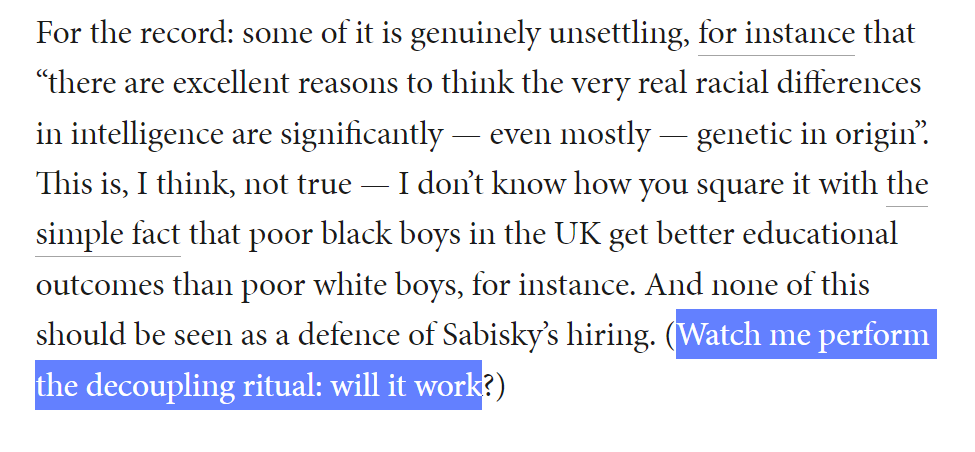On Decoupling
The pros and cons of insensitivity
I'm a bit of a prick. In online discourse[1], specifically. People are frequently convinced that I’m deliberately trying to wind them up. Which is unfortunate because that’s generally not my goal - I view places like twitter as an opportunity to clarify my own thoughts, browse through others’ and sometimes get direct feedback. In that regard, people who are willing to engage are valuable - better yet, free! - resources that need to be managed for optimal harvesting, not driven to fury.
So, having this superficially commendable - if somewhat sociopath-flavoured - orientation, why do I fail so often?
The normal explanation for tribulations on social media is that the other people are to blame / the platform itself because it restricts the normal cues and social structures. But I’m actually broadly pro-people and I actively *like* the restrictions.
So, no, the problem is me. But it’s quite hard to look candidly at one’s own flaws. Much easier to look at flaws in someone else. In this case, I’m thinking specifically of Richard Dawkins - the depth of his blind spot to how other people will respond to tone-blind analysis of emotive subjects is matched only by his inclination to charge into the heart of it. Like a dyspraxic who *just won’t* stop trying to juggle knives - while strolling through nurseries. And I’m *far worse* - the only reason I haven’t been (metaphorically) hung from a lamp post by my tongue is I’m thankfully dramatically more obscure.
What is at the heart of this lamentable behaviour? Tom Chivers wrote a great article back in 2020 after Dawkins engaged in some knife-juggling on the subject of eugenics. He introduces the concept of “Decoupling” - the process of disassembling concepts into their constituent parts, separating them from each other/surrounding context to look at each in turn - and the notion that some (“high-decouplers”[2]) are more comfortable with this and some people (“low-decouplers”) are less.
He goes on to frame the conflicts that arise as due to a difference in models of the world/cultural perceptions of ritual of decoupling. But - while I like the general pacifist lets-all-get-along tone - I don’t think that’s quite right.
I think you can broadly clump negative responses to “high-decouplers” into two categories:
(1) You’re Doing The Right Thing But So Badly It’s Wrong. This criticism comes from low- and high-decouplers alike and it’s not about the *type* of analysis you’re engaging in but displaying a disproportionate lack of care/disrespect for the subject. Dawkins essays on evolutionary biology are exquisite because he loves the subject and he’s meticulous. His essays on other subjects are terrible because they’re not meticulous and he doesn’t respect the subjects.
(2) You Enjoy Yoga But Forcing Me Into Downward Dog Is Just Sadism. This criticism comes from low-decouplers. The thing about ‘decoupling’ is that it’s an exercise - it takes effort and involves some discomfort. Which is why people who do it in their free time come across like other exercise-pricks - a bit sanctimonious about the benefits, a bit dismissive of the discomfort other people might feel and a bit addicted. The difference is that norms around discourse/opaqueness of the process makes it easier for people who are not up for this exercise (at that time/in general) to feel obligated to engage.
In fairness to Dawkins (/nerds in general), I think this is a case of a broadly shared blind spot. Most people are very well aware if they fancy the discomfort of yoga or a marathon - but they seem a lot less likely to know ahead of time whether they’ll fancy thinking about the pros and cons of eugenics or the exactitudes of what defines a Nazi.
You don’t stop a yoga session because someone[3] is finding Downward Dog uncomfortable because chances are it’s an expected level of discomfort.
But discussions on twitter about controversial subjects are much more likely to draw in people who don’t realise how uncomfortable they’ll make them and for whom the discomfort doesn’t lead to insights but merely anger. And - to crowbar in some politics - there’s reason to think this might relate to the Social Liberalism-Authoritarianism axis because disgust sensitivity predicts level of Authoritarianism.
Many words, such metaphor - time to force a conclusion. I’m dancing around a distinction here - Chivers, Dawkins and me are all nerds, but I’ve followed Tom Chivers on twitter for quite a while and he’s not surrounded by nearly the same level of angry people. In his article, he engages in ‘decoupling’ and probes at some quite emotive points - he even poses the question of whether this will cause opprobrium:
I don’t think there’s any real risk. Why? Because he’s *obviously quite careful*. Same way the existence of the discipline Genocide Studies doesn’t generally upset people - highly emotive subject, analysed by high-decouplers - but with evident disciplinary care. Being - proportionately and visibly - careful matters, who knew?[4]
[1] Yes, ‘discourse’ is clunky - but not *as* bad as ‘debate’.
[2] Nerds!
[3] Me
[4] Yes, well - I’ve sat through movies with worse payoffs.



High decoupling ability is also associated with AS (ASD 1). When it comes to low-decouplers criticizing this approach to knowledge (as opposed to the ethical reaction some have regarding disrespect/touching controversial issues) it's described as "seeing the trees but missing the forrest". Of course the willingness to "touch controversial issues" unphazed is another common AS trait.
Careful decoupling in social media, a medium designed for outrage, can be done but it is work. Empathy helps- if I weigh the emotional impact of my words and the risk they pose in a search for understanding, I may try different words and hope nobody's fire is lit. It's a honey or vinegar kind of thing...